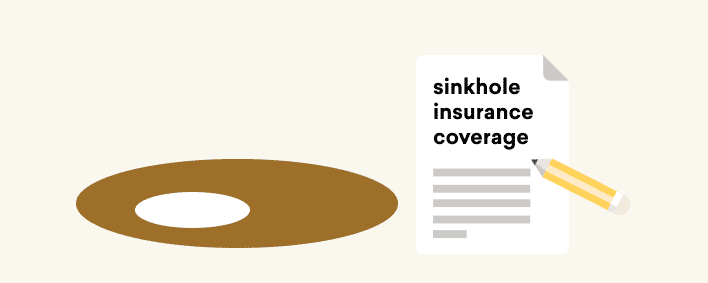What Is Sinkhole Insurance and Who Needs It?
Our goal is to give you the tools and confidence you need to improve your finances. Although we receive compensation from our partner lenders, whom we will always identify, all opinions are our own. By refinancing your mortgage, total finance charges may be higher over the life of the loan.
Credible Operations, Inc. NMLS # 1681276, is referred to here as “Credible.”
Sinkholes are fairly uncommon in most of the United States, but some states — primarily in the South — experience them more often, and the damage can be devastating.
Unfortunately, a standard home insurance policy doesn’t cover sinkholes. If you live in an area that’s susceptible to them, you’ll need to purchase sinkhole insurance.
Here’s what you need to know about how sinkhole insurance works and whether you should consider buying it:
What is sinkhole insurance?
Sinkhole insurance is a type of insurance coverage that provides financial protection in the event that a sinkhole damages or destroys your home. This can occur if moving water dissolves rocks under the surface of the earth, creating cavities or caves that weaken the surface, ultimately causing the ground to collapse.
Depending on the type of coverage you buy, it may cover the cost to repair or rebuild your home and other structures on your property, including repairing the foundation and stabilizing the ground your property sits on. It may even cover the cost of replacing personal property that gets damaged or lost in the sinkhole event.
How does sinkhole insurance work?
Sinkhole insurance can come in the form of an add-on to your existing homeowners insurance policy, or a separate policy. When you apply for sinkhole insurance, the insurer will conduct a visual inspection of your property before approving your policy.
If a sinkhole does occur and you have coverage, you’ll need to prove that your home has sustained structural damage or is in danger of collapsing. Evidence may include buckling walls and floor or foundation displacement. You’ll typically need to enlist a professional engineer to confirm the damage and its cause.
Who needs sinkhole insurance?
The states in the chart below tend to experience the most damage due to sinkholes, according to the U.S. Geological Survey (USGS).
However, evaporite rocks, which are a type of rock that’s susceptible to dissolution in water, underlie between 35% and 40% of the U.S. The good news is that most of these rock types are far underground, so the risk is lower. If you live in an area where sinkholes are more common, contact your insurance agent to inquire about sinkhole insurance.
Florida and catastrophic ground cover collapse
If you’re a Florida resident, your homeowners insurance policy includes catastrophic ground cover collapse coverage. This may cover sinkhole damage, but only if the sinkhole results in the following:
- An abrupt collapse of the ground cover
- A depression in the ground cover that’s visible to the naked eye
- Structural damage to the building, including the foundation
- The government condemns your home and orders you to vacate it.
If one of these factors is not in play, you won’t be covered, so it may make sense to buy additional sinkhole insurance.
Check Out: Does Home Insurance Cover Water Damage?
How much does sinkhole insurance cost?
The cost of sinkhole insurance coverage varies depending on where you live and your property itself. In some cases, it can cost thousands of dollars per year just for the premiums.
Like many other insurance policies, sinkhole insurance requires a deductible, which can be as much as 10% of your dwelling coverage limit. So, if you have $500,000 in coverage, you’d need to shell out $50,000 in the event of a sinkhole claim.
But while an insurance claim might be costly for you, the insurance carrier still takes on the brunt of the expense of repairing or rebuilding your home.
Which insurance providers offer sinkhole insurance?
It can be difficult to find sinkhole insurance in states where the risk is low. Even in high-risk states, options can vary.
In Florida and Tennessee, insurance carriers are required by law to offer optional sinkhole coverage as an add-on to a homeowners insurance policy. However, an insurer may choose to decline coverage based on an inspection of your property. In Missouri, you can purchase a stand-alone policy through the Missouri FAIR Plan.
It’s a good idea to consult with an insurance professional to understand where you can get coverage and what it entails. You can visit the National Association of Insurance Commissioners website to find insurance agents in your area.
Learn More: Home Insurance Exclusions: What’s Not Covered?
Is sinkhole insurance worth it?
Sinkholes cause an average of $300 million or more in damage annually, according to a report from the Committee on Natural Resources. But the federal government doesn’t have comprehensive enough data to know how many sinkholes occur every year.
If you live in a state where sinkholes tend to do the most damage, it should be on your radar. Consider contacting your state’s geological survey or the National Society of Professional Surveyors to understand the risk for your area or even have a survey done of your property.
Once you have a good understanding of your risk, weigh it against the ongoing cost of buying a policy and the deductible you’d have to pay. Remember, though, that if you’re at risk, even a policy with a 10% deductible could save you hundreds of thousands of dollars.
Keep Reading: Does Home Insurance Cover Natural Disasters?
Disclaimer: All insurance-related services are offered through Young Alfred.




